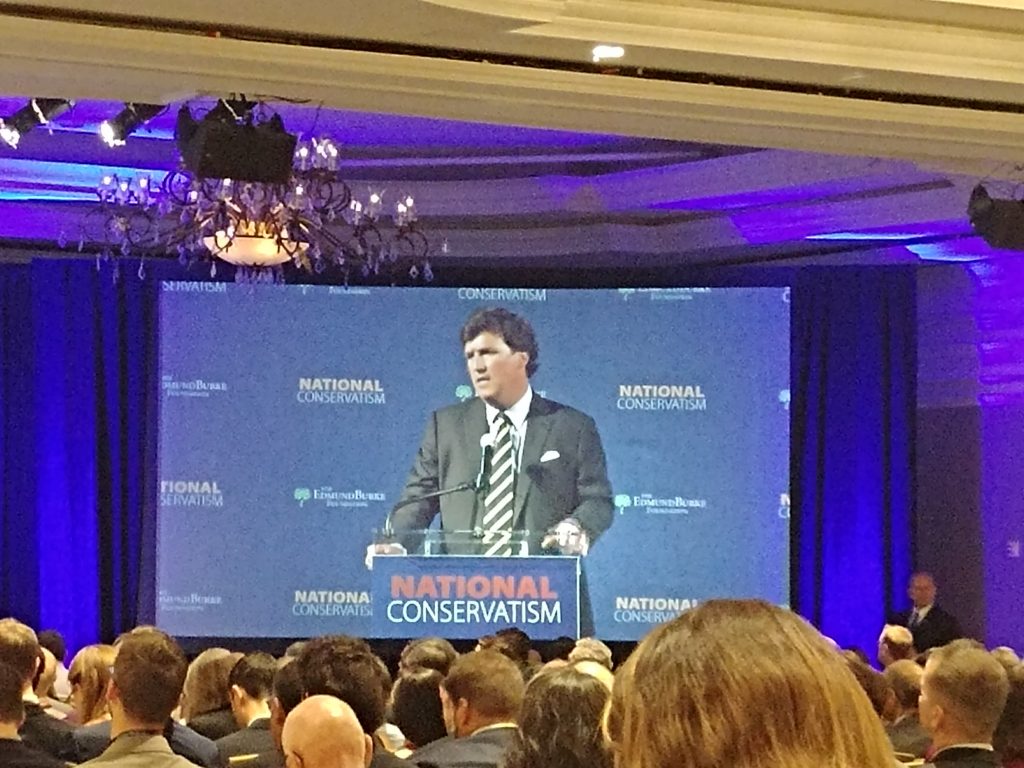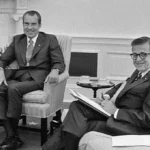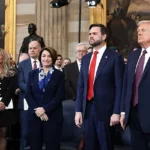Blog Post
Conservatives gather in Washington, D.C. to hammer out a new “conservative nationalism”
By Jonathon Van Maren
Many of you have probably been following the internecine war conservatives have been engaging in over the past several months, with those who believe classical liberalism may have outlived its usefulness in an era where the Left seeks the utter destruction of its opponents (represented by conservative writer Sohrab Ahmari), and those who believe that only classical liberalism provides us the infrastructure to live in a nation of warring creeds, represented by National Review writer David French. I’ll write an analysis of this back-and-forth later, but suffice it to say that with the hijacking of the GOP by President Donald Trump and the implosion of the conservative consensus, many are stepping forward to suggest that perhaps with America’s current coming-apart and the polarization that seems to ramp up by the day, that it is time for a new national conservatism.
I’m currently writing from the press gallery at the back of the Ritz-Carlton Ballroom, where the founding conference of the Edmund Burke Foundation, a new public affairs institute “dedicated to developing a revitalized conservatism for the age of nationalism” is underway. From the National Conservatism website:
Politics in America, Britain, and other Western nations have taken a sharp turn toward nationalism—a commitment to a world of independent nations. This has been disorienting to many, not least the American conservative movement, which has, since the fall of the Berlin Wall in 1989, grown increasingly attached to a vision of a global “rules-based liberal order” that would bring peace and prosperity to the entire world while attenuating the independence of nations.
The return of nationalism has created a much-discussed “crisis of conservatism” that may be unprecedented since modern Anglo-American conservatism was formulated by Russell Kirk, William Buckley, and their colleagues in the 1950s. At the heart of this crisis is a question: Is the new American and British nationalism a hostile usurper that has arrived on the scene to displace political conservatism? Or is nationalism an essential, if neglected, part of the Anglo-American conservative tradition at its best?
The conference on “National Conservatism” will bring together public figures, journalists, scholars, and students who understand that the past and future of conservatism are inextricably tied to the idea of the nation, to the principle of national independence, and to the revival of the unique national traditions that alone have the power to bind a people together and bring about their flourishing.
We see this public conference as the kick off for a protracted effort to recover and reconsolidate the rich tradition of national conservative thought as an intellectually serious alternative to the excesses of purist libertarianism, and in stark opposition to political theories grounded in race. Our aim is to solidify and energize national conservatives, offering them a much-needed institutional base, substantial ideas in the areas of public policy, political theory, and economics, and an extensive support network across the country.
The first plenary featured a lineup seeking to place some hard boundaries around what sort of nationalism the speakers and scholars who have gathered from around America seek to hammer out over the next several days. The first lineup of speakers were very clear: The hour is late. The owl of Minerva flies only at the dusk. But as America comes apart, here we are, and let us see what can be done to preserve a nation that so many still love.
Chris Demuth, the co-author with Yuval Levin of Religion and the American Future, began with a lecture titled “The Nationalist Awakening.” We need a new national conservatism, he told the audience, and one not based on a homogenous people—that was never the American project—but one united around history and tradition. This idea, he said, will be inevitably attacked, but it is necessary. This new national conservatism might not be successful, but yet we must try for the sake of America. In the same breath, he clarified: This is not something new. It is the old ways of getting along that are essential. We have rejected natural restraint, for example, and we must return to it again. Everything is an option today, even one’s sex, and perhaps it is technology that has removed so many restraints that we actually believe we no longer need it. Demuth’s bewilderment was a reflection of how fast some of these things have come about: “I do not know where this has come from,” he admitted. But yet, this conference, he stated, will be about creating that new framework, the vehicle for that return.
Next up was David Brog, the former Executive Director of Christians United for Israel and the author of In Defense of Faith: The Judeo-Christian Idea and the Struggle for Humanity. He echoed Demuth’s sense that this conference was necessary, and that “hopefully, it will come right on time.” His lecture was titled the “Roots of American Nationalism,” addressing several key questions: Why nationalism? Why now? From where? These questions, he said, were essential as America unravels into an unhappy confederation of rival tribes. White nationalists—and every speaker took time to condemn them specifically and vehemently—are murdering Jews in synagogues and blacks in their churches. The Left is torqueing our differences for political gain. In response, we must develop a renewed patriotism that connects us to one another, one that inspires us to mutual sacrifice. The Left, he noted, says that nationalist means white nationalism, and the racists welcome this idea. But it is not, and must not be.
Brog was the first one to mention Trump. The president, he noted, has declared himself a nationalist. So what does that mean? To Brog’s mind, this means going back to the economic nationalism espoused by Alexander Hamilton, Theodore Roosevelt, and Abraham Lincoln. Hamilton didn’t want immigrants naturalized before they knew what they were being naturalized to. Roosevelt wanted immigrants to assimilate so that they would become Americans first and foremost. And Lincoln believed that naturalization was essential, replete with a test that proved loyalty to America. This was summed up by the famous rendering of Lincoln in his First Inaugural Address: “The mystic chords of memory, stretching from every battlefield and patriot grave to every living heart and hearthstone, all over this broad land, will yet swell the chorus of the Union, when again touched, as they surely will be, by the better angels of our nature.”
This, Brog stated, sums up the American spirit. Anyone can become an American, but they must put down roots and adopt this spirit. My nationalist role model, he declared, is not Oswald Mosley or Charles Lindbergh. It is his grandfather, a Jewish immigrant from Romania—a role model not because he was so unique, but because he was so common. He experienced much discrimination—because he was a Jew, there were jobs that he could not get. But he loved America, wanted to be an American, and studied English fervently as one of the keys to becoming an American. It reminded me of something Tucker Carlson said recently: A nation cannot survive being governed by those who hate it. This is nationalism, Brog stated, something that harks back to those mystic chords of memory. It is not about race, but transcends it: Men and women of every color and creed have died for America. And that is why nationalism can offer “us a shining path home.”
Mary Eberstadt, who I consider to be one of the greatest living writers on the culture wars, seemed to have one goal with her speech “Social Conservatism and the National Interest”: Disabusing anyone of the notion that libertarianism could be a solution to any of our current troubles. Because we are diverse, she said, we need nationalism. Without it, we will have anarchy. If we will not have a nation and a constitution, then we will figuratively or literally have Hobbesian war. (It was the first mention of the potential of civil war, and it would not be the last.) We must focus on the national interest, Eberstadt said, and it is essential to realize that libertarianism is not the solution.
Libertarianism straight up, she said to laughter, is like moonshine. It has given us the creed of “So, what?” So what if American workers can’t get jobs? So what if flyover country is experiencing a drop in life expectancy? So what if parents don’t want biological boys in the girls’ bathroom? So what if parents don’t want their kids to get inculcated in the septic dogmas of the sexual revolution in schools but don’t have the money to send them elsewhere? We must be driven by something else. In short, nationalism needs tradition-minded conservatism. It needs Athens, Jerusalem, the intellectual Christian tradition, the American founders, and a knowledge of America’s complex, war-pocked history. It needs to be guided by memory, humility, discernment, and gravitas—things that the creed of so-what lacks utterly. Without these things providing nationalism with ballast, it will go dangerously adrift.
One example, Eberstadt noted, is that libertarianism cannot respond to identity politics. Another is the horrifying death toll due to the opioid crisis: 400,000 Americans have perished thus far, partially due to weak regulation of the pharmaceutical industry. Some estimates have that number as high as 700,000. It would take Sophocles to describe this tragedy, Eberstadt said, but we can still do math. Carnivorous capitalism unfettered by traditional conservatism and a dedication to the national interest has resulted in this misery, and many Americans have been left behind. Those dying in the drug crisis should not be considered the collateral damage of policies that libertarians champion, and only traditional conservatism has the language to articulate that truth.
Finally, there is the “sexual disorder that disfigures the public square.” We used to be able to opt out if we didn’t care for the sexual revolution, but no more. The totalitarian hysteria of progressives prevents that. Some self-sacrificing parents can shield their children through homeschooling or enrollment in private schools. But what about all the children who have no choice but to go to public schools? Will we abandon them to be social guinea pigs? Look at the flight from biological science, she noted, the absurd insistence that there is no such thing as male and female, and how these brand-new concepts are being written into law. This, she said to cheers, is enforced collective delusion. Libertarianism, of course, can say nothing about this. Traditional conservatism, on the other hand, has the mechanisms necessary for a nationalism oriented towards the public good.
The growing state, Eberstadt explained, cannot be understood without the implosion of the family. Big government enables the fatherless home. Broken families enable big government. Again, libertarianism cannot address this. Additionally, she said, adding to the chorus condemning white nationalism, the values of Christianity and Judaism—championed by social conservatives—are the strongest antidotes to racism. It was the clergy who primarily led the great anti-racist movements, from abolition to slavery. Martin Luther King Jr. cannot be understood outside the context of American religiosity. In short, the deepest needs of the Americans who are left behind and the deepest fissures in American society can only be addressed by tradition-minded conservatism. Increasingly, Americans see each other as malignant, with their prejudices stoked by pronouncements by Hillary Clinton on the deplorables and Obama on the bitter clingers with their guns and religion. And then there is the insanity of the Left on gender, which, Eberstadt noted to laughter, “can only be described as clinically interesting.” Social conservatism provides answers to all of the most difficult questions that we face, and we must return to it.
The next speaker, Rusty Reno of First Things, concurred with Eberstadt in his comments on “Christian Universalism and American Nationalism.” America, he stated, is a nation, not a church. It is the church that is the agent of Christian universalism—Christ came to found God’s kingdom, not America. It was Reno who dropped the first inevitable mention of the Puritan John Winthrop’s description of America as “a shining city on a hill,” although it was Ronald Reagan who inserted the optimistic word “shining” into that famous rendering. That said, Reno noted, America is still a special place with a tradition, a people rooted in history and in place. A people remain a people insofar as they belong both to a place and to each other. It was America’s “almost-chosen status,” said Reno, that encapsulates the American exceptionalism that is key to conservative nationalism. The Bible also affirms the idea of nation and stands against modern ideologies, which seek unbounded empire. Ideologies are comprehensive theories, not traditions, and as such should be treated with suspicion. Reno ended by again targeting the white nationalists with their twisted, race-driven conceptualization of a nation that would destroy the American project entirely.
Finally, Yoram Hozany, (author of last year’s The Virtue of Nationalism) took the stage. Hazony’s speech was a passionate and contemptuous condemnation of modern conservatism, which, he said, got drunk with power after the fall of Communism. As a result, Hazony stated, conservatives lost all interest in traditionalism, in the Bible, in Judaism, in Christianity. All that interested them was economic liberalism and the rights of the atomic individual. Hazony, unlike the other speakers, actually sounded angry. For a generation, he declared, we have watched them waste our financial resources. They have wasted the lives of thousands of servicemen in the pursuit of the export of democracy. They are the ones who built up China, one of America’s primarily competitors. The Middle East has been torched by American foreign policy, with nothing but death and humiliation to show for it. America has been flooded with porn and drugs. The industrial heartland has been destroyed. The borders have been dissolved. Christianity is failing here as it has failed in Europe. And we live, he said, in the “wreckage of their fatal conceit.” His speech, essentially, was the intellectual version of Trump’s “American Carnage” inaugural address.
American conservatism has become defined by American arrogance, Hozany declared, and as such, today “is our independence day.” This unexpected statement was met by a wave of applause. Today, said Hozany with both force and heat, we separate from the neo-cons, from the neo-liberals, the libertarians, the classical liberals—all those who subscribe to the ideologies that see the “atomic individual” as the only thing you need to know about politics. It is time to do away with hyper-individualism and recognize that you cannot simply view the world in terms of economics—people are not simply consumers or customers. In short, Hazony noted, we’ve been boiling everything down to economics while America burns. The real world is about competing tribes and nations, not individuals. What we need is national independence, national cohesion, and natural traditions—or eventually, one day, one side will simply refuse to give up power to the other after an elections, and there will be civil war.
The opening speakers of the National Conservatism conference sought to explain what national conservatism is and what it is not. It is not race-based, and it rejects white nationalism as a repulsive cancer seeking to move into the void left by the collapsed consensus. It is not libertarian. It is not economically liberal. It is, on the other hand, socially conservative, pro-family, and in opposition to the metastasizing sexual revolution racing through the culture at breakneck speeds. What that means specifically, in terms of policy and in terms of principle, we will find out in the hours and days to come.








